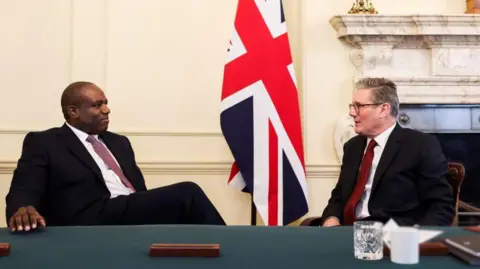In the realm of international diplomacy, the United Kingdom finds itself navigating complex geopolitical tensions, particularly in the run-up to the G7 summit scheduled to take place in Alberta, Canada. With escalating conflicts between Israel and Iran, British officials have been tirelessly engaged in a series of telephone calls, WhatsApp messages, and strategy sessions to assess the situation and prepare appropriate responses. This careful dance of diplomacy has led to the establishment of two crisis centers within the UK Foreign Office, demonstrating the gravity of the current landscape.
The first crisis center focuses on the Middle Eastern conflict, specifically the volatile dynamics between Israel and Iran, while the second is dedicated to managing the fallout from a tragic plane crash that occurred in Ahmedabad, India. These dual crises illustrate the multifaceted nature of diplomatic challenges that the UK faces both at home and abroad. With leaders and officials continuously communicating, the objective appears to be maintaining a delicate balance between responsive action and measured public messaging.
Prime Minister Sir Keir Starmer, in his interactions with leaders from around the world, has refrained from explicitly endorsing Israel’s military responses, reflecting a balanced approach to diplomacy. Instead, he acknowledges the UK’s longstanding concerns regarding Iran’s nuclear ambitions—an issue that underpins the current tensions. British officials had anticipated the likelihood of Israeli military actions against Iran since last April, indicating a proactive stance in preparing for potential outcomes.
One highlight of the diplomatic activity included a brief but significant conversation between Prime Minister Starmer and Israeli Prime Minister Benjamin Netanyahu, spurred by Netanyahu’s request. This dialogue underscores the importance of direct communication in addressing sensitive issues related to security and regional stability. Additionally, Starmer’s conversation with U.S. President Donald Trump further emphasizes the global ramifications of the situation. While exchanging pleasantries, they primarily focused on the unrest between Israel and Iran, signifying the urgency with which leaders are approaching this crisis.
On the operational front, the UK’s Foreign Secretary, David Lammy, has been pivotal, conducting talks with his counterparts from Iran, Jordan, and Saudi Arabia, furthering the discussion on how to manage the ongoing tensions. Lammy also convened a joint meeting with foreign ministers from France, Germany, and Italy, as well as the European Union’s foreign affairs chief, Kaja Kallas, thereby reinforcing the collective effort to address the crisis collaboratively. While a high-level COBRA meeting—a UK governmental mechanism for emergency response—is not currently scheduled, relevant officials from various departments are convening to monitor and discuss developments continually.
It is worth noting that conversations surrounding significant forums, such as the upcoming UN summit on a two-state solution, have encountered delays, reflecting the turbulence currently affecting diplomatic initiatives. With heightened scrutiny surrounding the UK government’s positions and actions, Starmer and his cohorts are keenly aware of the need for careful articulation of their policies, particularly in a charged international environment.
As preparations for the G7 summit intensify, during which leaders will congregate in Alberta to deliberate on critical issues, including Middle Eastern unrest, the UK’s role and stance will be closely watched. The outcomes of this conference may hold significant implications for the future conduct of international relations, particularly regarding diplomatic approaches to conflict resolution and security cooperation.
In summary, the UK is currently engaged in a precarious yet strategic diplomatic maneuvering in light of the conflict between Israel and Iran. While officials maintain a cautious tone, focusing on established concerns regarding nuclear proliferation, the need for collective international action remains paramount. As the G7 summit looms on the horizon, the efficacy of these diplomatic efforts will undoubtedly be tested on a global stage.



